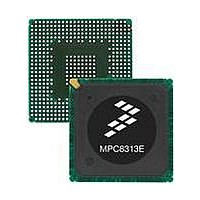MPC8313CVRADDB Freescale Semiconductor, MPC8313CVRADDB Datasheet - Page 84

MPC8313CVRADDB
Manufacturer Part Number
MPC8313CVRADDB
Description
MPU POWERQUICC II PRO 516-PBGA
Manufacturer
Freescale Semiconductor
Datasheet
1.MPC8313CZQAFFB.pdf
(100 pages)
Specifications of MPC8313CVRADDB
Processor Type
MPC83xx PowerQUICC II Pro 32-Bit
Speed
267MHz
Voltage
0.95 V ~ 1.05 V
Mounting Type
Surface Mount
Package / Case
516-PBGA
Processor Series
MPC8xxx
Core
e300
Data Bus Width
32 bit
Development Tools By Supplier
MPC8313E-RDB
Maximum Clock Frequency
400 MHz
Operating Supply Voltage
- 0.3 V to + 1.26 V
Maximum Operating Temperature
+ 105 C
Mounting Style
SMD/SMT
Data Ram Size
16 KB
I/o Voltage
2.5 V
Interface Type
I2C, SPI, UART
Minimum Operating Temperature
- 40 C
Program Memory Type
EEPROM/Flash
Lead Free Status / RoHS Status
Lead free / RoHS Compliant
Features
-
Lead Free Status / Rohs Status
Lead free / RoHS Compliant
Available stocks
Company
Part Number
Manufacturer
Quantity
Price
Company:
Part Number:
MPC8313CVRADDB
Manufacturer:
FREESCAL
Quantity:
672
Company:
Part Number:
MPC8313CVRADDB
Manufacturer:
Freescale Semiconductor
Quantity:
10 000
Thermal
(edge) of the package is approximately the same as the local air temperature near the device. Specifying
the local ambient conditions explicitly as the board temperature provides a more precise description of the
local ambient conditions that determine the temperature of the device.
At a known board temperature, the junction temperature is estimated using the following equation:
where:
When the heat loss from the package case to the air can be ignored, acceptable predictions of junction
temperature can be made. The application board should be similar to the thermal test condition: the
component is soldered to a board with internal planes.
21.2.3
To determine the junction temperature of the device in the application after prototypes are available, the
thermal characterization parameter (
measurement of the temperature at the top center of the package case using the following equation:
where:
The thermal characterization parameter is measured per JESD51-2 specification using a 40 gauge type T
thermocouple epoxied to the top center of the package case. The thermocouple should be positioned so
that the thermocouple junction rests on the package. A small amount of epoxy is placed over the
thermocouple junction and over about 1 mm of wire extending from the junction. The thermocouple wire
is placed flat against the package case to avoid measurement errors caused by cooling effects of the
thermocouple wire.
21.2.4
In some application environments, a heat sink is required to provide the necessary thermal management of
the device. When a heat sink is used, the thermal resistance is expressed as the sum of a junction to case
thermal resistance and a case to ambient thermal resistance:
where:
84
T
T
R
P
T
T
Ψ
P
R
R
R
J
B
J
T
θ
D
D
θ
θ
θ
JT
JB
JA
JC
CA
= junction temperature (°C)
= junction temperature (°C)
= thermocouple temperature on top of package (°C)
= board temperature at the package perimeter (°C)
= power dissipation in the package (W)
= power dissipation in the package (W)
Experimental Determination of Junction Temperature
Heat Sinks and Junction-to-Case Thermal Resistance
= thermal characterization parameter (°C/W)
= junction-to-board thermal resistance (°C/W) per JESD51–8
= junction-to-ambient thermal resistance (°C/W)
= junction-to-case thermal resistance (°C/W)
= case-to- ambient thermal resistance (°C/W)
T
T
R
J
J
θ
JA
= T
= T
MPC8313E PowerQUICC
= R
B
T
+ (
+ (R
θ
JC
Ψ
θ
JT
+ R
JB
× P
× P
θ
CA
D
D
)
)
Ψ
JT
) can be used to determine the junction temperature with a
™
II Pro Processor Hardware Specifications, Rev. 3
Freescale Semiconductor











